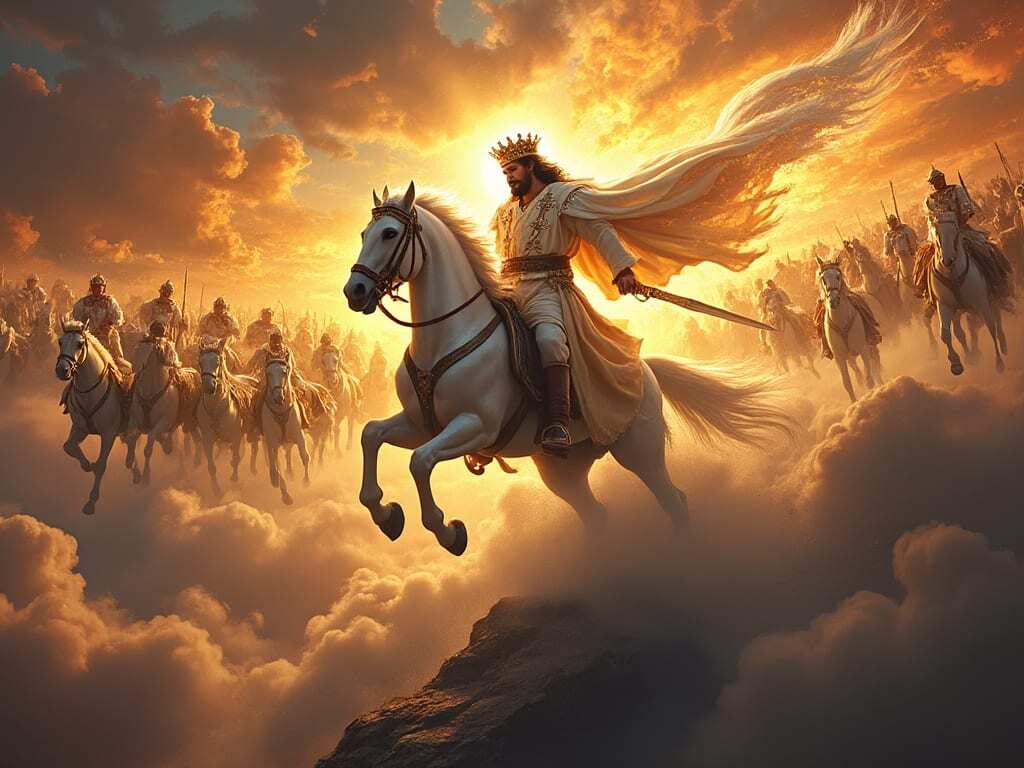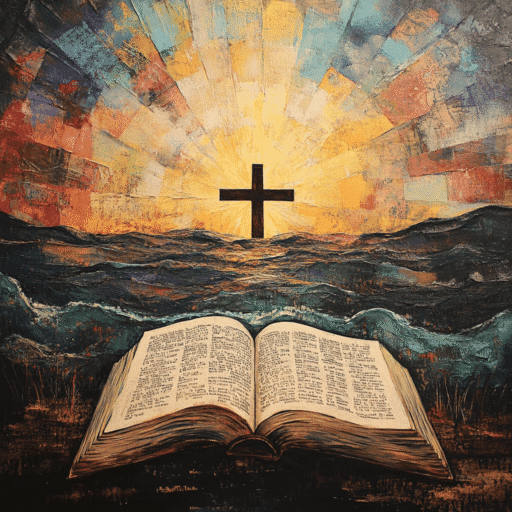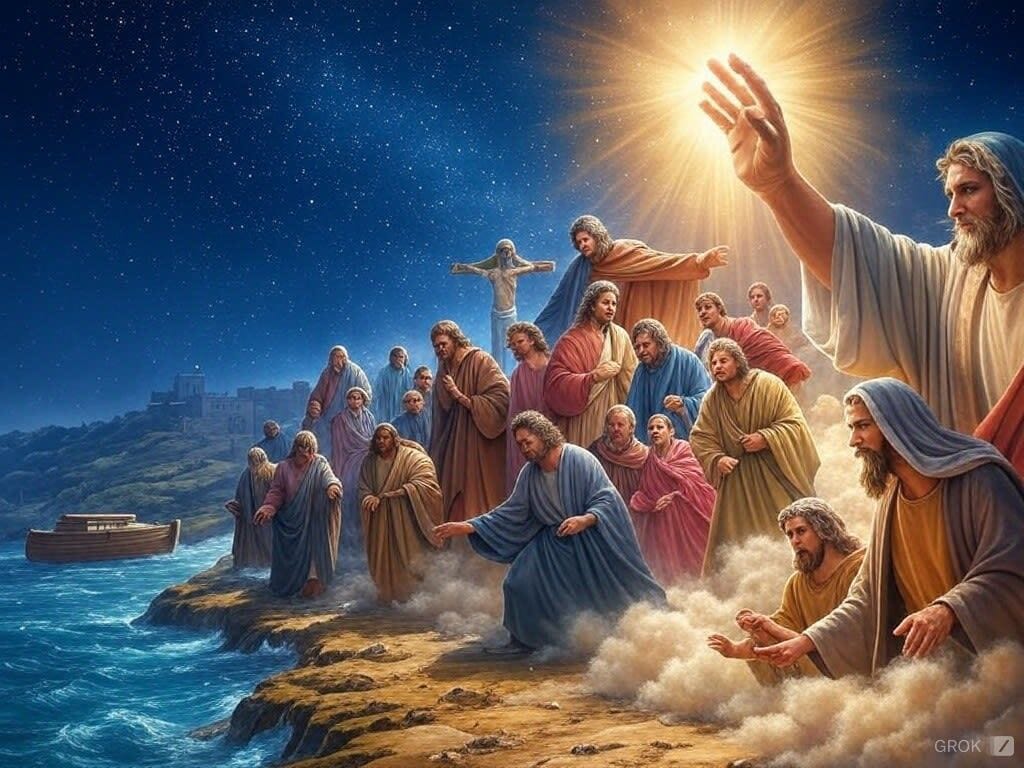End Times and Eschatology: Unpacking the Bible’s Story of Final Hope
The end times and eschatology—the study of last things—is one of the most profound, complex, and often controversial Bible topics. It’s a subject that sparks curiosity, confusion, and sometimes, fear. Prophecies in the books of Daniel and Isaiah link to the climactic visions in Revelation. Jesus’s own teachings echo throughout the New Testament, reminding us that God’s story is racing toward a definitive and glorious resolution. This is not a jumble of disconnected ideas; it is a unified narrative of God’s plan to redeem, renew, and reign—no matter what the future holds.
At Biblescholarship.com, we believe that understanding the end times and eschatology should bring hope and clarity, not anxiety. This comprehensive guide will unpack the core biblical concepts, explore the different interpretive frameworks, and show you why the study of end times and eschatology ultimately points to the faithfulness of God.
What Is Eschatology? Defining the Study of Last Things
Eschatology is the branch of Christian theology concerned with the final events of world history and the ultimate destiny of humanity. The term is derived from the Greek word eschatos (ἔσχατος), meaning “last,” and logia (λoγiα), meaning “study of.” Therefore, end times and eschatology is literally the study of “last things.” This complex field attempts to synthesize the many prophetic, poetic, and historical writings across the Old and New Testaments to form a cohesive timeline of future events.
Biblical eschatology is generally divided into two primary areas:
- Individual Eschatology: This focuses on the destiny of the individual after physical death (e.g., the intermediate state, heaven, and hell).
- General Eschatology: This focuses on the final events of human history (e.g., the Second Coming of Christ, the Millennium, and the new heavens and new earth).
The primary goal of studying the end times and eschatology is not date-setting, which the Bible explicitly prohibits (Matthew 24:36). Instead, this study reveals God’s consistent character: He is sovereign over time, keeps His promises, and will bring about perfect justice. The prophecies serve a profound moral and ethical purpose, designed to transform how we live today by instilling a sense of urgency and holy expectation.
The Four Main Interpretive Views on the Millennium
A major point of difference in the study of end times and eschatology is the Millennium, which refers to the literal or symbolic 1,000-year reign of Christ mentioned repeatedly in Revelation 20. Interpreting the nature and timing of this period leads to four main theological positions. Navigating these interpretive frameworks is essential to fully understanding the field of end times and eschatology.
1. Premillennialism
- Core Belief: Christ’s Second Coming occurs before the literal, 1,000-year reign. Premillennialism holds that Christ will return physically to Earth to establish a visible, earthly kingdom administered from Jerusalem.
- Key Emphasis: This view emphasizes the literal fulfillment of God’s promises made to Israel in the Old Testament, often distinguishing between God’s plan for ethnic Israel and His plan for the Church. Prophecies regarding Israel’s future land and kingdom are seen as needing a future, physical fulfillment.
2. Postmillennialism
- Core Belief: Christ’s Second Coming occurs after the Millennium. Postmillennialism teaches that the Millennium is a long, indeterminate period of time during the current church age.
- Key Emphasis: This view maintains that the success of the Gospel and the righteousness of the Church will lead to a “golden age” where the world and its institutions are largely Christianized and morally upright. Christ returns to a largely redeemed and peaceful earth.
3. Amillennialism
- Core Belief: Amillennialism views the “1,000 years” as symbolic, not literal. The Millennium is the entire period between Christ’s first coming and His second coming.
- Key Emphasis: Christ is reigning now from heaven through the Church. Satan is currently bound, restricting his deception of the nations. Christ’s Second Coming will be followed immediately by the general resurrection and the eternal state. This view is commonly held within Covenant Theology.
4. Preterism (Partial and Full)
- Core Belief: Preterism (from the Latin praeter, meaning “past”) views many or all of the prophecies in Revelation and the Olivet Discourse as having already been fulfilled in the first century, particularly with the destruction of the Jerusalem Temple in A.D. 70.
- Key Emphasis: Partial Preterism sees most prophecies fulfilled but reserves the Second Coming and eternal state for the future. Full Preterism claims all prophecy, including the final resurrection, has already occurred. This perspective fundamentally changes how one approaches the study of end times and eschatology.
5. Historical and Covenantal Views
Some views, like Historicism and Idealism, focus less on a strict chronological future and more on a continuous fulfillment throughout church history or the timeless spiritual conflict between good and evil. Covenant Theology often leans toward Amillennialism, emphasizing the continuity of God’s plan for His people (the Church) over time.
The Chronology of Last Things
The study of end times and eschatology involves understanding a sequence of pivotal events that unfold outside of the current church age. This chronology is interpreted by many scholars as the two-part return of Christ—the Rapture for His church, and the Second Coming with His church—separated by a period of divine judgment. Its purpose is to remove the Church from the earth.
The Rapture and The Great Tribulation
Among the most discussed Bible topics related to the end times is the Rapture. It is the first event in this prophetic sequence, marking the imminent return of Christ for His church.
- The Rapture Defined: The Rapture is the event described in 1 Thessalonians 4:16-17, where Jesus descends from heaven, and all living and dead believers are “caught up” (harpazo in Greek, meaning to snatch away) to meet the Lord in the air. Its purpose is to remove the Church from the earth.
- Timing Debate: As noted, the timing (Pre-, Mid-, or Post-Tribulation) is a central debate. The Pre-Tribulation view emphasizes the promise that the Church is not appointed to suffer God’s wrath (1 Thessalonians 5:9) and will be removed before the Great Tribulation.
- The Great Tribulation: is a future 7-year period of unprecedented suffering and divine judgment on Earth. This period is based on Daniel’s prophecy of the seventieth week (Daniel 9:24-27). This time of judgment is directed against the unrepentant world and prepares Israel for its ultimate restoration. This is when God pours out His wrath, as detailed by the seals, trumpets, and bowls in the Book of Revelation on an unrepentant world.
- The 144,000: An important group mentioned during this period is the 144,000, described as being sealed on their foreheads (Revelation 7:1-8). They are identified as 12,000 from each of the twelve tribes of Israel. They are seen as God’s protected, evangelistic witnesses during the Great Tribulation, proclaiming the Gospel to the world in a time of intense global persecution. Their sealing ensures their divine protection to fulfill their vital mission before the final judgments are poured out. This group underscores the specific focus God places on Israel during the end times.
For an in-depth study on Revelation that includes the rapture and a pre-millennial view, watch the video series by Chuck Missler below.
The Second Coming of Christ
The Second Coming is the visible, public return of Jesus Christ to Earth, which occurs at the end of the Great Tribulation. This event is distinct from the Rapture and is characterized by judgment and the establishment of Christ’s physical reign.
- Return in Glory: The Second Coming is described in Matthew 24:30 and Revelation 19. Jesus returns as a conquering King, accompanied by His saints (the Church). It is a public, global, and decisive event.
- Armageddon and Judgment: Christ returns to execute judgment, defeating the Antichrist and the False Prophet at the Battle of Armageddon. He then casts them and Satan into the Lake of Fire.
- The Millennial Reign: Following the Second Coming, Christ establishes His 1,000-year Millennial Reign on Earth. The study of end times and eschatology sees this period as the literal fulfillment of the Old Testament kingdom promises to Israel.
Key Players in the Great Tribulation and the Judgments of Revelation
The Great Tribulation is dominated by escalating divine judgments and a set of evil figures who oppose God’s plan.
The Dragon, The Antichrist, and the Mark of the Beast
- The Antichrist: The Antichrist is the final, ultimate human opponent of Christ and the Church. He is described as a political leader who rises to global power, demands worship, and persecutes God’s people.
- The Mark of the Beast: The Antichrist enforces a global, economic, and religious system where all people must receive a “mark” (mark of the beast) to buy or sell (Revelation 13:16-17). This mark of the beast is a sign of allegiance to the Antichrist and results in eternal judgment for those who take it. The number 666 is symbolically associated with the Antichrist and his system.
- The False Prophet: A religious figure who works alongside the Antichrist, performing miracles and deceiving humanity into worshiping the beast and taking the mark of the beast.
- The Whore of Babylon: This highly symbolic figure (Revelation 17) represents the massive, powerful, and alluring false religious and economic system that controls the kings of the earth and promotes sin. The Whore of Babylon is a picture of global idolatry, luxury, and opposition to the true worship of God.
- The Dragon: Identified explicitly as Satan, the Devil (Revelation 12:9). He is the unseen power behind the Antichrist and the False Prophet, seeking to destroy God’s plan and people.
The Judgments of Revelation: Seals, Trumpets, and Bowls
The Book of Revelation outlines God’s judgment in three distinct, escalating series, each designed to bring humanity to repentance.
- The Seven Seals: the initial stage of judgment, unleashed when Christ, the Lamb of God, opens a scroll. The first four seals introduce the Four Horsemen of the Apocalypse (conquest, warfare, famine, and death). The subsequent seals detail the cries of martyrs, cosmic disturbances, and silence in heaven, setting the stage for the next wave.
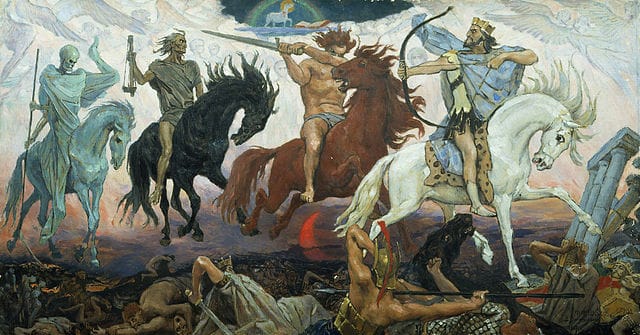
- The Seven Trumpets: the second, more intense wave of judgment, affecting the natural world. These judgments include fire mixed with hail, striking a third of the trees and grass; the poisoning of a third of the sea and fresh water; and a third of the sun, moon, and stars being darkened. These trumpet judgments demonstrate God’s direct wrath upon the earth’s environment and population.
- The Seven Bowls: the final, most severe, and rapid judgments. They represent the completion of God’s wrath, poured out directly onto the earth. These judgments include painful sores on those who took the mark of the beast, the complete turning of the seas and rivers to blood, the scorching of the sun, and a massive, final earthquake that levels the cities of the world. The bowls are described as being poured out in quick succession, signifying the finality of God’s judgment.
The Final Acts of Divine Justice and Restoration
The narrative of end times and eschatology moves swiftly from the Tribulation to the definitive and eternal acts of God’s justice and restoration.
The Great White Throne Judgment
Following the Millennial Reign, Revelation 20:11-15 describes the great white throne judgment. This is the final, ultimate judgment for all the unrighteous dead from all ages. The scene is one of absolute purity and justice.
- The Books and The Verdict: At the great white throne judgment, two sets of books are opened: the books containing a record of every person’s deeds, and the Book of Life. Judgment is based on works (proving the nature of their life) and whether the person’s name is found in the Book of Life. Those whose names are not found are cast into the Lake of Fire, which is the final, eternal place of separation from God. The great white throne judgment serves as the definitive end to the fate of the wicked and a stark reminder that all people will face divine accountability.
The Resolution: New Heavens and New Earth
The culmination of end times and eschatology is the establishment of the New Heaven and New Earth (Revelation 21-22). This is the final, eternal state, where God dwells with His people.
- What Will Heaven Look Like?: The establishment of the New Heaven and New Earth is the ultimate fulfillment of God’s promise. The answer to what will heaven look like is a vision of perfection and unhindered communion with God. The New Jerusalem descends from heaven to the New Earth.
- Perfection and Fellowship: In this new creation, the curses of the Fall are entirely removed. There will be no more death, sorrow, crying, or pain (Revelation 21:4). The most important feature is the unhindered, face-to-face fellowship with God and Christ.
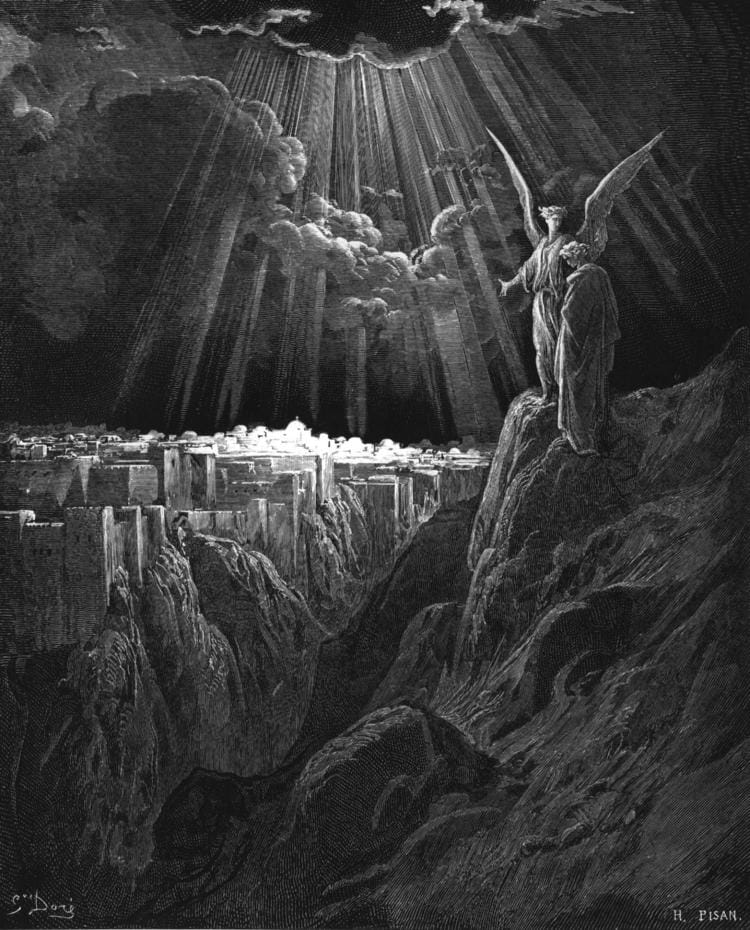
The Role of Israel and the Church in Eschatology
Different eschatological frameworks assign different roles to Israel and the Church. Dispensationalism emphasizes a future, distinct role for national Israel in the Millennial Kingdom, with the Church being raptured prior to the Tribulation. Covenant Theology emphasizes the continuity of God’s people, viewing the Church as the spiritual fulfillment of the promises made to Israel. Understanding these views is key to making sense of various prophecies concerning the final disposition of God’s chosen people in the end times and eschatology.
Conclusion: Living in Light of the End Times
The study of end times and eschatology is a profound pursuit that reveals the consistency and faithfulness of God’s plan. It shows that prophecies in Isaiah link to Revelation’s climax, and Jesus’ teachings echo Daniel’s dreams. This is a story racing toward resolution, inviting you in, and asking how you’ll respond to its call.
Ultimately, this Bible topic is not meant to fuel sensationalism or date-setting, which the Bible clearly prohibits. Instead, it reveals a God who redeems, renews, and reigns—no matter what the future holds. Our primary calling is to live with holy expectation, sharing the Gospel and serving others faithfully until Christ’s return. The truth of the end times and eschatology should inspire a life of holiness and purpose.
For a detailed scholarly analysis of eschatology related to the Apostle Paul, delve into this academic source by Dr. Irving F. Wood. Since most scholars agree that Paul’s epistles were written before John’s Apocalypse, or Revelation, it is worth considering what was taught earlier in church history.
